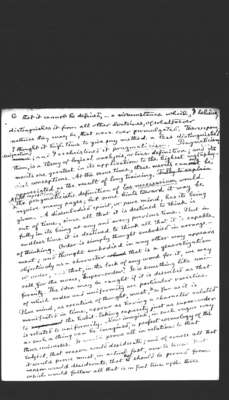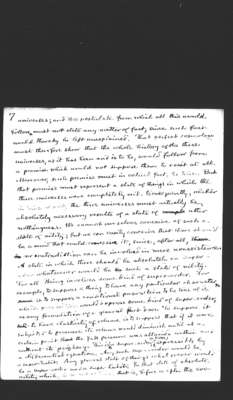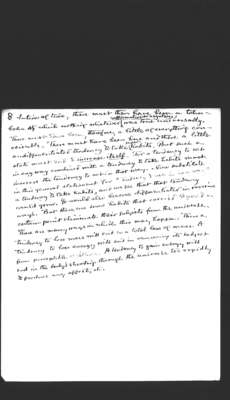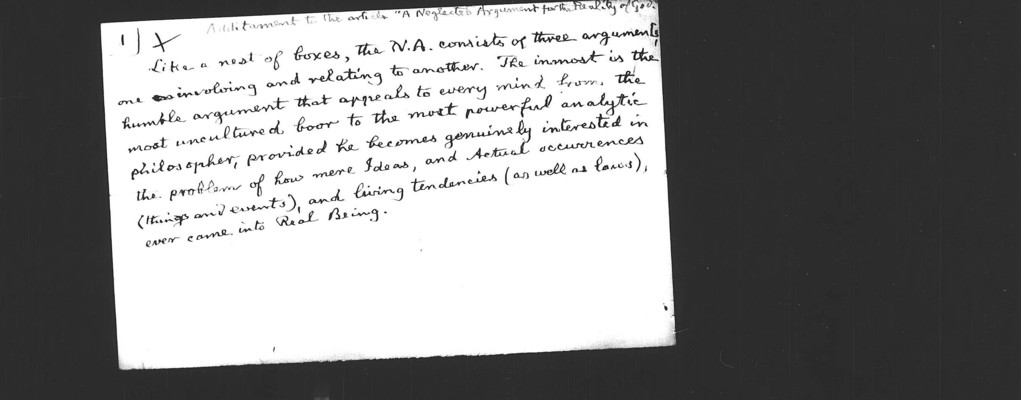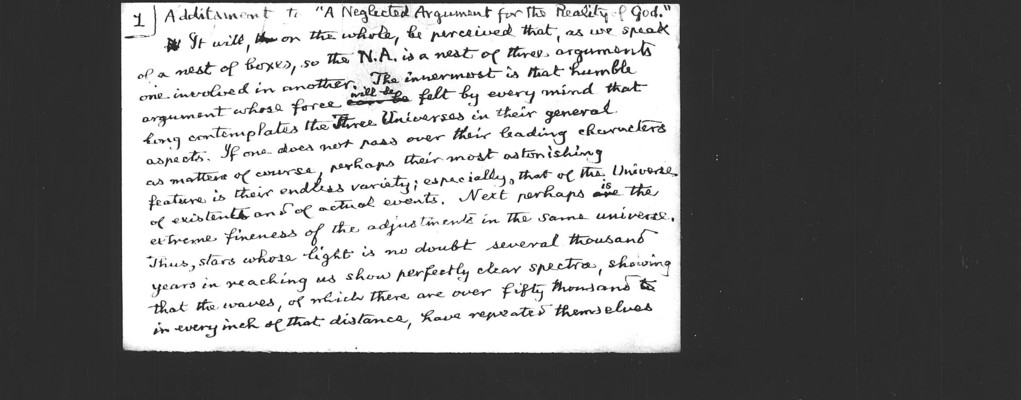Pages
6
6
that it cannot be defined,—a circumstance which, I believe, distinguishes it from all other doctrines, of whatsoever natures they may be, that were ever promulgated. Thereupon, I thought it high time to give my method a less distinguished designation; and I rechristened it pragmaticism. Pragmaticism, then, is a theory of logical analysis, or true definition; and its merits are greatest in its application to the highest metaphysical conceptions. At the same time, these merits can only be appreciated as the result of long training. A full exposition of the pragmaticistic definition of Ens necessarium would require many pages; but some hints toward it may be given. A disembodied spirit, or pure mind, has its being out of time, since all that it is destined to think is fully in its being at any and every previous time. But in endless time it is destined to think all that it is capable of thinking. Order is simply thought embodied in arrangement; and thought embodied in any other way appears objectively as a character that is a generalization of order, and that, in the lack of any word for it, we may call for the nonce, 'Super-order.' It is something like uniformity. The idea may be caught if it is described as that of which order and uniformity are particular varieties. Pure mind, as creative of thought, must, so far as it is manifested in time, appear as having a character related to the habit-taking capacity just as super-order is related to uniformity. Now imagine, in such vague way as such a thing can be imagined, a perfect cosmology of the three universes. It would prove all in relation to that subject, that reason could desiderate; and of course all that it would prove must, in actual fact, now be true. But reason would desiderate that that should be proved from which would follow all that is in fact true of the three
7
7
universes; and the postulate from which all this would follow must not state any matter of fact, since such fact would thereby be left unexplained. That perfect cosmology must therefore show that the whole history of the three universes, as it has been and is to be, would follow from a premise which would not suppose them to exist at all. Moreover, such premise must in actual fact be true. But that premise must represent a state of things in which the three universes were completely nil. Consequently, whether in time or not, the three universes must actually be absolutely necessary results of a state of utter nothingness. We cannot ourselves conceive of such a state of nility; but we can easily conceive that there should be a mind that could conceive it, since, after all, no contradiction can be involved in mere nonexistence. A state in which there should be absolutely no super-order whatsoever would be such a state of nility. For all Being involves some kind of super-order. For example, to suppose a thing to have any particular character is to suppose a conditional proposition to be true of it, which proposition would express some kind of super-order, as any formulation of a general fact does. To suppose it to have elasticity of volume is to suppose that if it were subjected to pressure its volume would diminish until at a certain point the full pressure was attained within and without its periphery. This is a super-order, a law expressible by a differential equation. Any such super-order would be a super-habit. Any general state of things whatsoever would be a super-order and a super-habit. In that state of absolute nility which, in or out of time, that is, before or after the evo-
8
8
lution of time, there must then have been a tohu-bohu of which nothing whatever affirmative or negative was true universally. There must have been, therefore, a little of everything conceivable. There must have been here and there a little undifferentiated tendency to take super-habits. But such a state must tend to increase itself. For a tendency to act in any way combined with a tendency to take habits must increase the tendency to act in that way. Now substitute in this general statement for "tendency to act in any way" a tendency to take habits, and we see that that tendency would grow. It would also become differentiated in various ways. But there are some habits that carried beyond a certain point eliminate their subjects from the universe. There are many ways in which this may happen. Thus a tendency to lose mass will end in a total loss of mass. A tendency to lose energy will end in removing its subject from perceptible existence. A tendency to gain energy will end in the body's shooting through the universe too rapidly to produce any effect, etc.
9
1
Additament to the article "A Neglected Argument for the Reality of God."
Like a nest of boxes, the N.A. consists of three arguments, one involving and relating to another. The inmost is the humble argument that appeals to every mind from the most uncultured boor to the most powerful analytic philosopher, provided he becomes genuinely interested in the problem of how mere Ideas, and Actual occurrences (things and events), and living tendencies (as well as laws), ever came into Real Being.
10
1
Additament to "A Neglected Argument for the Reality of God."
It will, on the whole, be perceived that, as we speak of a nest of boxes, so the N.A. is a nest of three arguments one involved in another. The innermost is that humble argument whose force will be felt by every mind that long contemplates the Three Universes in their general aspects. If one does not pass over their leading characters as matters of course, perhaps their most astonishing feature is their endless variety; especially that of the Universe of existents and of actual events. Next perhaps is the extreme fineness of the adjustments in the same universe. Thus, stars whose light is no doubt several thousand years in reaching us show perfectly clear spectra, showing that the waves, of which there are over fifty thousand in every inch of that distance, have repeated themselves
